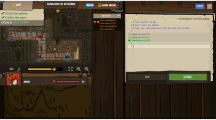Abstract
Computer programming courses are an essential aspect of STEM education that comes with many challenges. Students struggle to master the fundamentals of programming, which results in low pass rates and engagement. The usage of gamification in programming courses has been recognized as a potential technique that could increase student engagement as well as impact learning in a positive way. Therefore, this paper proposes a web portal game that aims to help pre-college students learn the python programming language and prevent those challenges from occurring. The proposed game will be designed and structured to give school students an enhancing experience to learn programming on their own educational journey while generate a deep understanding of main programming principles using diverse problems with enthusiasm and motivation. To keep the student immersed in the game, a rewarding system and a players’ scoreboard are developed. This will increase students’ motivation and competition among their peers.
Access this chapter
Tax calculation will be finalised at checkout
Purchases are for personal use only
Similar content being viewed by others
References
Venter, M.: Gamification in STEM programming courses: state of the art. In: 2020 IEEE Global Engineering Education Conference (EDUCON), pp. 859–866 (2020)
Moosa, A.M., Al-Maadeed, N., Saleh, M., Al-Maadeed, S.A., Aljaam, J.M.: Designing a mobile serious game for raising awareness of diabetic children. IEEE Access 8, 222876–222889 (2020)
Ali, Z., Saleh, M., Al-Maadeed, S., Abou Elsaud, S.: Understand my world: an interactive app for children learning Arabic vocabulary. In: 2021 IEEE Global Engineering Education Conference (EDUCON), pp. 1143–1148 (2021)
Dandashi, A., Alja’am, J.M., Saleh, M.: A combined cognitive multimedia model for children with intellectual disabilities. In: IEEE Global Engineering Education Conference (EDUCON), pp. 507–512 (2013)
Saleh, M.S., Aljaam, J.M., Karime, A., Elsaddik, A.: Learning games for children with intellectual challenges. In: International Conference on Information Technology Based Higher Education and Training (ITHET), pp. 1–5 (2012)
SoloLearn: Sololearn. https://www.sololearn.com/learn. Accessed 14 Sept 2022
CodeMonkey: Code monkey. https://www.codemonkey.com/courses/banana-tales. Accessed 14 Sept 2022
Codeingame: codeingame. https://www.codingame.com/start. Accessed 14 Sept 2022
Scratch: Scratch. https://scratch.mit.edu/. Accessed 14 Sept 2022
Alice: Alice. http://www.alice.org/. Accessed 14 Sept 2022
Code Combat: Code combat. https://codecombat.com/. Accessed 14 Sept 2022
checkiO: Checkio. https://checkio.org/. Accessed 14 Sept 2022
Tynker: Tynker. https://www.tynker.com/. Accessed 14 Sept 2022
Petri, G., Von Wangenheim, C.G., Borgatto, A.F.: ‘MEEGA+: an evolution of a model for the evaluation of educational games. In: Proceedings of INCoD/GQS (2016)
Petri, G., Wangenheim, C.G.V., Borgatto, A.F.: MEEGA+, systematic model to evaluate educational games. In: Lee, N. (ed.) Encyclopedia of Computer Graphics and Games, pp. 1–7. Springer, Cham (2018). https://doi.org/10.1007/978-3-319-08234-9_214-1
Author information
Authors and Affiliations
Corresponding author
Editor information
Editors and Affiliations
Rights and permissions
Copyright information
© 2024 The Author(s), under exclusive license to Springer Nature Switzerland AG
About this paper
Cite this paper
Saleh, M., Aqel, R., Elmoghazy, M., Al Bader, S. (2024). Pythra’a: A 2D Game for Supporting Pre-college Students Learning Python Programming Language. In: Auer, M.E., Cukierman, U.R., Vendrell Vidal, E., Tovar Caro, E. (eds) Towards a Hybrid, Flexible and Socially Engaged Higher Education. ICL 2023. Lecture Notes in Networks and Systems, vol 901. Springer, Cham. https://doi.org/10.1007/978-3-031-53022-7_48
Download citation
DOI: https://doi.org/10.1007/978-3-031-53022-7_48
Published:
Publisher Name: Springer, Cham
Print ISBN: 978-3-031-53021-0
Online ISBN: 978-3-031-53022-7
eBook Packages: Intelligent Technologies and RoboticsIntelligent Technologies and Robotics (R0)




